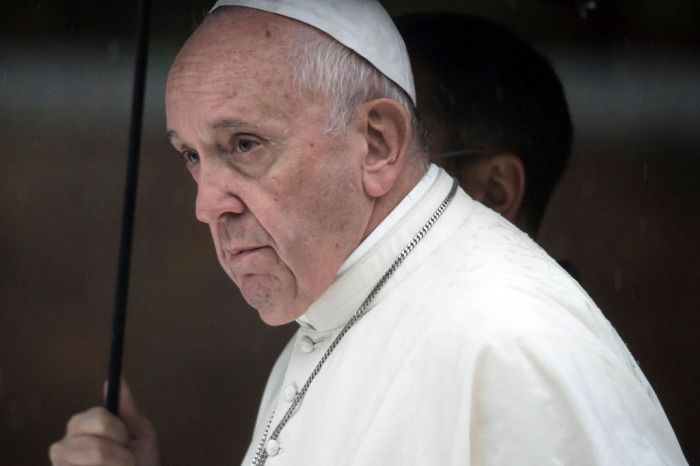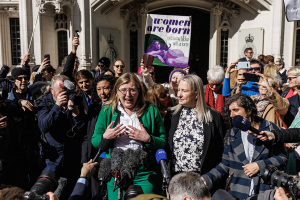Pope Francis calls European Commission's rescinded inclusivity guidelines 'ideological colonization'

Pope Francis has criticized the European Commission’s now-rescinded guidelines that advised officials to refrain from making references to Christmas and Christian names, warning that “dictatorships have tried to do” the same thing throughout history.
On Monday, the pontiff commented in response to a question about a provision outlined in a 30-page document outlining the “European Commission Guidelines for Inclusive Communication.”
The provision at issue urged European commissioners, members of the executive branch of the European Union, to “avoid assuming that everyone is Christian” because “not everyone celebrates the Christian holidays, and not all Christians celebrate them on the same dates.”
The guide instructed commissioners and staff to avoid phrases like, “Christmas time can be stressful” and instead use a term such as “holiday times can be stressful” to accommodate those celebrating Hanukkah or other holidays.
At a press briefing following the Catholic leader’s trip to Greece, Constandinos Tsindas of the Cyprus Broadcasting Corporation asked Pope Francis for his thoughts about the European Union’s push to “replace the word ‘Christmas’ with ‘Holidays.’”
“This is an anachronism,” the pope said, referring to “the European Union document without ‘Christmas.’”
“This is what many dictatorships have tried to do in history: think of Napoleon, think of the Nazi and communist dictatorship,” he said, according to a transcript provided by Catholic News Agency. “[I]t is a way of diluted laicity, distilled water.”
Pope Francis maintained that “the European Union must take in hand the ideals of the founding fathers, which were ideals of unity, [and] of greatness” and “be attentive not to make way for ideological colonization.”
He warned that “ideological colonization” could “divide countries and [make] the European Union fall.” He called for the supranational government to “respect each country as it is structured inside, the variety of countries” instead of working to “standardize.”
“Be careful because sometimes they come and throw projects like this one there and they don’t know what to do,” he added. “Each country has its own peculiarity, but each country is open to the others.”
He urged the European Union to “be careful not to be a vehicle of ideological colonization.”
In response to pushback, the European Commission pulled the document.
Helena Dalli, the European Union’s Commissioner for Equality, who played an instrumental role in crafting the document, announced the withdrawal of the guidelines in a statement last week.
“My initiative to draft guidelines as an internal document for communication by Commission staff in their duties, was intended to achieve an important aim: to illustrate the diversity of European culture and showcase the inclusive nature of the European Commission towards all walks of life and beliefs of European citizens,” Dalli stated. “However, the version of the guidelines published does not adequately serve this purpose.”
Describing the publication as “not a mature document” that “does not meet all Commission quality standards,” Dalli concluded that “the guidelines need more work.” She indicated that she “will work further on this document” and will look into the concerns “with the view of addressing them in an updated version of the guidelines.”
Concern was raised with regards to some examples provided in the Guidelines on Inclusive Communication, which as is customary with such guidelines, is work in progress. We are looking into these concerns with the view of addressing them in an updated version of the guidelines. pic.twitter.com/90ZK8rpPb2
— Helena Dalli (@helenadalli) November 30, 2021
Besides the guidance on Christmas, other provisions in the document are causing critics concern. Specifically, the guidelines advise commissioners to “avoid terms like ‘both sexes’” and “ladies and gentlemen” because they are seen as excluding “intersex people” and “gender-queer people.”
“When speaking about or representing families, make sure you include non-heterosexual or non-cisgender households, or indeed single parent households,” the guide continued. The guidelines also advised not “asking what pronoun a person ‘prefers’” because it “assumes that gender identity is a personal preference.”
While the document consists mainly of suggestions for commission staff, the guidelines begin by unveiling non-negotiables that must “be followed at all times” when communicating on the commission’s behalf. Staff was ordered to “never use gendered nouns such as ‘workmen, policemen’ or masculine pronouns (he, his) as a default.”
“When asking about gender, do not offer only male/female options, add ‘other’ and ‘prefers not to say.’ Never address an audience as ‘ladies and gentlemen’ but use expressions such as ‘Dear colleagues.’”
Ryan Foley is a reporter for The Christian Post. He can be reached at: ryan.foley@christianpost.com





























